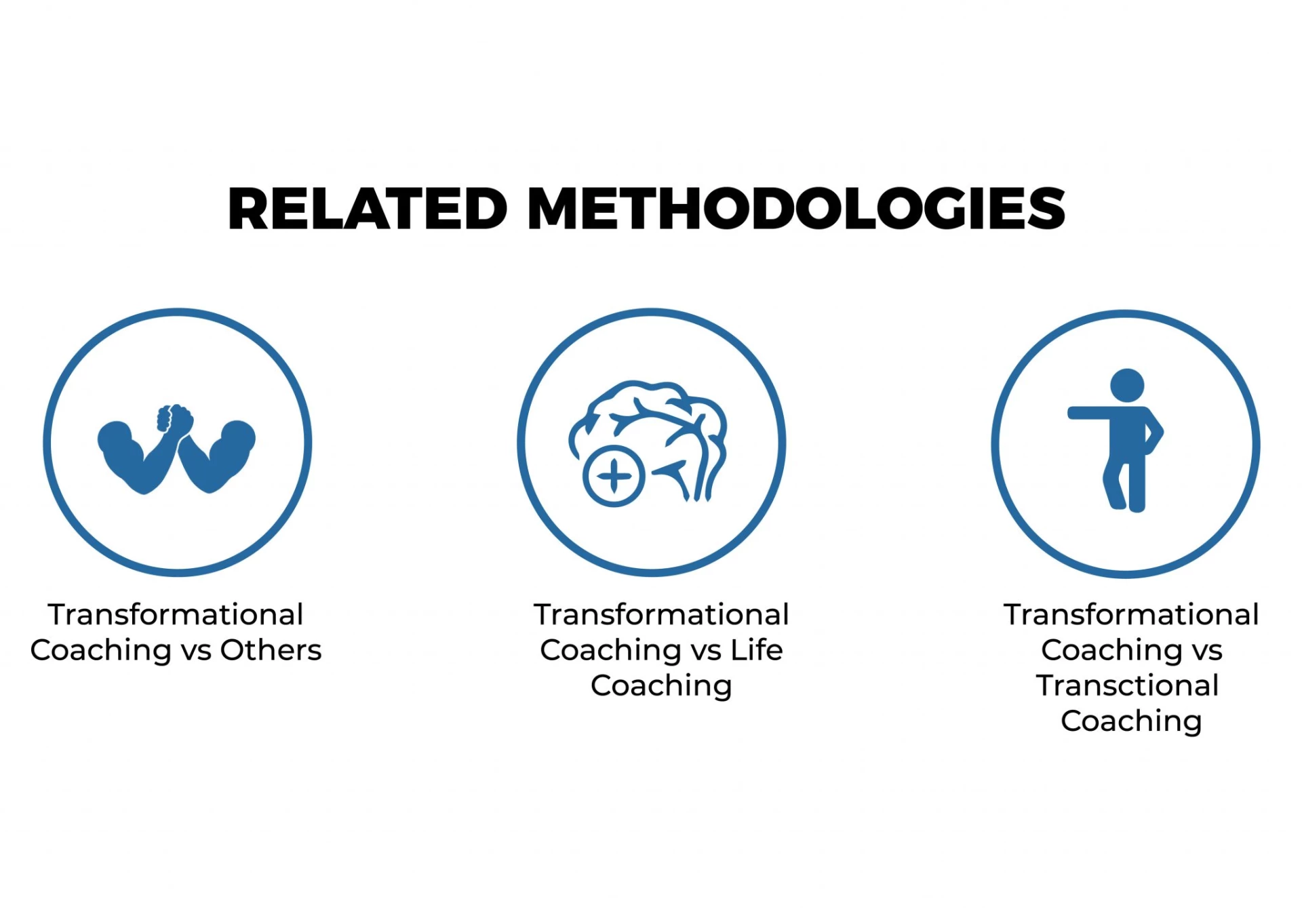Blog » Becoming a Coach » Transformational Coaching: The Definitive Guide
Transformational Coaching
The Definitive Guide
Are you searching for how to get started with Transformational Coaching?
Then this definitive guide will give you all the tips, tricks, and resources needed to begin the process of Transformational Coaching right away.
I will walk you through all the aspects of Transformational Coaching from the origins, fundamentals, techniques, types, and whatever else is necessary to begin your Transformational Coaching journey.
So, if you are looking for:

- An in-depth approach to Transformational Coaching
- Ways to significantly turn around your client’s life
- Types of Transformational Coaching
- Resources on Transformational Coaching
Then this guide is perfect for you.
Let’s get started.
Don’t have time to read the whole guide right now?

No worries. Let me send you a copy so you can read it when it’s convenient for you. Just let me know where to send it (takes 5 seconds)
Yes! Give me my PDFChapter 1:
The Fundamentals
Anyone beginning their journey into Transformational Coaching will no doubt be confused by the intricacies of the topic. So I will break it down for you in simplistic terms while ensuring that all angles are covered.
Even coaches looking to switch their field would benefit from a strong understanding of Transformational Coaching. Indeed, many coaches find themselves changed during the process of learning, and with a deeper insight into their own personalities.

Let’s take an in-depth look at the coaching process and its principles.
What is Transformational Coaching?
Transformational Coaching is a process that brings about a holistic change in your client, allowing them to grow and develop into completely different beings. The main idea is that you help your client see themselves in an alternative perspective, enabling them to move past problems and obstacles they were previously unable to overcome.
The word transformation itself means a dramatic change in shape or appearance. Logically, Transformational Coaching uses this idea to rewrite someone’s behavior and past learnings.
What is the main principle behind it?
Much of Transformational Coaching has evolved from various principles such as Cognitive Behavioral Coaching, Transactional Analysis, and Person-Centered Therapy. Each of these has its unique aspects which combine to form what is now known as Transformational Coaching.
Cognitive Behavioral Coaching primarily focuses on an individual’s thoughts about a situation. What an individual thinks about a situation affects how they feel about that situation. Hence, controlling our thoughts will similarly also control how we feel about the situation.
Transactional Analysis is a theory of communication that categorizes people into different ego states. The communicator is taught to identify these ego states and alter them to effectively communicate better.
Person Centered Therapy is an approach that believes that every human being has the potential to live up to their fullest potential, but end up with various hindrances and barriers due to life experiences.
Critical points from each of these theories have been adapted and modeled into a framework that holistically addresses each of these aspects into a single unified methodology, referred to as Transformational Coaching.
Who needs this and why?
Certain types of people respond extremely positively towards Transformational Coaching. These people are usually:
- Open-minded and curious
- Enthusiastic about personal development
- Willing to take responsibility for their life
- Prepared to change to succeed
- Someone who believes in their inner potential.
As you can see, these are all traits of a strong-willed individual. However, past experiences and circumstances can result in these same individuals developing mental barriers that prevent them from succeeding.
This is where transformational coaching is utilized, breaking down these barriers and allowing them to realize their true potential.
Chapter 2:
Origins
At this point, you will notice that Transformational Coaching is vastly different in what it sets out to achieve, compared to other forms of coaching.
In fact, this is not surprising. Transformational Coaching is a multidisciplinary approach to coaching, and as such, is a combination of methodologies and practices designed to holistically bring about change.

How did it originate?
Transformational coaching has no fixed and definite origin point. Instead, it draws its roots from multiple places and ideologies.
It is a continuously evolving coaching methodology – it takes the best practices from the older methodologies and combines them with a fresh perspective and newer methods.
Why is Transformational Coaching sought after?
Transformational Coaching is becoming increasingly popular due to its evolutionary nature. Its practice itself demands better understanding and constant improvement in its methodology, with both coach and client benefiting from repeated Transformational Coaching sessions.
Many Transformational Coaching models treat the desired outcome as a result of the coaching process, and not as the end goal. This results in a coaching model where the client’s development is prioritized over achieving the end goal – rather, the resultant change in mindset allows the client to self actualize themselves and push further towards their goal.
Chapter 3:
Related Methodologies
All forms of coaching result in a change in the client, but not all end results or even the methodologies are the same.
In that regard, Transformational Coaching can appear similar to other types of coaching. Here, we will learn what sets it apart, making it unique enough to be its own form of coaching.

Differentiating Transformational Coaching from other Coaching Methods
There are many types of coaching which are similar on the surface but have their specialties. Most commonly, you will find people mistaking Transformational Coaching for Life Coaching or Transactional Coaching. You will find a lot of overlap amongst coaching niches like Spiritual Coaching, Wellness Coaching, and Personal Development Coaching.
Difference Between Life Coaching and Transformational Coaching
The key difference between a life coach and a transformation coach is how they work with their clients.
Life coaches remain on the surface level when exploring a client’s inner thought patterns. Transformation coaches dig deeper into the mind of whomever they are working with – and help them make lasting changes to their behavior. It’s often a longer, more intense process. Life coaches make you better at what you do. Transformational coaches make you better yourself!
Difference Between Transactional Coaching and Transformational Coaching
In Transactional Coaching, the main difference is in the method of coaching engagement. With a transactional approach, goal setting is the foremost priority, and all the coaching steps are used to directly implement that goal.
The Transformational Coaching approach is a process that tackles the issue through building self-awareness and a perspective shift. It involves an overall understanding of what you want to accomplish but delves deeply into building awareness around any thoughts and assumptions that you may have about your topic.
Now that you have understood the different methodologies involved, you can get started with the process of transformational coaching.
Chapter 4:
How to Become a Transformational Coach
To get started with Transformational Coaching, you need a few basic prerequisites. Excellent communication skills, both verbal and non-verbal will help you tremendously in your Transformational Coaching.
You also should be inspirational and motivational in nature, along with high empathy and emotional intelligence.

This is because Transformational Coaching naturally tends to attract clients who have developed mental blocks, wherein the problem is not what the client perceives, but rather the self restrictions imposed upon themselves.
Empowering your clients to break through these obstacles is a reward in itself.
Let’s go into further detail on what makes an effective Transformational Coach.
Skills Needed
Before setting on the path of Transformational Coaching, it’s prudent to understand if you have the required skills and abilities needed to be effective in your coaching methodology.
Some of the basic skills that will help you are:
- Deep Listening
Transformational coaches have a knack for listening and understanding their clients on a profound level. They can detect changes in a client’s tone, words, and micro-expressions that can point to subconscious thoughts.
- High EQ
Understanding the emotions of others and your own is essential as a Transformational Coach.
- Open-minded
Change works both ways, and often coaches need to accept and have undergone personal change before being able to guide their clients through a similar process.
- Motivational
You need to be able to drive your clients to embark on a journey to explore their inner selves on a deeper level.
- Positive Nature
Transformational coaches can maintain a positive atmosphere, creating a safe space where the client feels free to open up and explore within.
- Rapport & Bond Building
For their clients to be able to truly open up, a coach will need to build deep levels of trust. This allows clients to relax, and only then will their deepest truths be revealed.
Educational Requirements To Become a Transformational Coach
In most coaching fields, there are no fixed educational requirements. Coaching is still an unregulated industry so you are not obligated to get a certificate.
However, certifications can help you gain credibility. Even a degree in fields like Psychology, Counseling, or Education will give you a significant advantage in helping your clients.
Business experience, Leadership roles, and years of work experience will also play a significant role in how effective you are as a transformational coach.
Techniques You Can Use
Now that I have covered the skills you need to hone to become a Transformational Coach as well as the educational requirements to be one, I will list out some common techniques you can use. These techniques will assist you in becoming a successful Transformational Coach.
This field builds a set of transferable skills by reprogramming the thought process of the subconscious and unconscious mind. As a coach, this is invaluable in modifying behavior patterns, as well as providing a set of tools that can quickly change the perspective of any situation.
- Neuroscience
The scientific study of the workings of the nervous system and the human brain. This understanding of how the brain functions helps us to create new neural pathways and ways of thinking. Similarly, multiple repetitions and positive reinforcement are researched techniques that help coachies provide their client with a growth mindset.
- Cognitive Behavioral Therapy (CBT)
A field of study similar to psychotherapy, where negative thought patterns are eliminated by altering undesirable behavior patterns. CBT is commonly used to treat a wide range of disorders, including depression and anxiety. Hence, it is an excellent tool that can be used in a non-therapeutic manner to help clients change unhelpful behavior patterns.
- Motivational Interviewing (MI)
This is a client-centered, directive method that encourages clients through various stages of change. The key concept here is that the more we talk about change, the more we bring ourselves on to the pathway to change. Coaches act as guides in this conversation, leading the client to continuously talk about their ability to change and their reason for doing so. This guiding process is the catalyst needed for the client to commit to the change.
- Hypnotherapy
A form of psychotherapy that engages in guided hypnosis to achieve a state of mindfulness and increased suggestibility. Here, the individual enters into a state of mind that allows them to access inner resources and communicate with their unconscious mind. In this state of mind, the coach can initiate positive thoughts and behaviors that are more easily accepted by the unconscious mind.
- Positive Psychology
A scientific method of techniques that helps individuals build a mindset of success and thriving. We teach the client to always look for the silver lining in every situation, thereby reframing even negative experiences into a positive outlook. In Chapter 5, let’s look at the ways in which the Transformational Coaching model is beneficial for your clients.
Chapter 5:
Benefits of Transformational Coaching
The best part about Transformational Coaching is a long-lasting change that goes beyond the initial coaching sessions, with compounding benefits that continue long after the end of the coaching.
Many of my clients have reported long-term behavioral changes, with some seeing continued changes even years down the line.

Some Commonly Noticed Benefits
Ranging from increased accountability to improved relationships, the benefits of Transformational Coaching are truly vast. I will walk you through some of the noticed benefits that you can leverage by applying Transformational Coaching.
- Increased Accountability
One of the most common benefits is that an individual learns to eliminate the ‘blame mindset’, and take greater responsibility for their actions.
- Empowerment
Transformational coaching often results in greater awareness of strengths and limitations, and ways to work these to the client’s advantage.
- Realization of True Potential
Clients undergoing transformation can visualize themselves as they truly are, devoid of their self-limiting beliefs.
- Creative Problem Solving
New perspectives also offer new solutions to an existing problem, which can easily be applied to other related scenarios.
- Improved Relationships
Many individuals have related stories of improved personal relationships with partners and family, as well as at their workplace.
- Better Leadership
Coaching can help overcome mental blocks that prevent a person from being able to lead a team effectively.
- Personal Fulfillment
All clients leave the process with a deeper appreciation of their environment, and increased levels of satisfaction.
- Healthier Habits and Discipline
Transformational coaching provides the push needed for individuals to work on improving their health and habits, as well as greater discipline.
- Positive Outlook
The process leads to an overall mindset of positivity and happiness, along with self-defined terms for success.
- Higher Emotional Intelligence
After undergoing transformation, clients often notice they are more in tune with themselves and with others around them. They can easily resolve conflicts and come to solutions that would have previously eluded them.
Of course, these are just a few of the thousands of potential benefits transformation coaching can bring. Every person will experience their own life-changing perspective, depending on their circumstances. Some of these different scenarios have been detailed in Chapter 6.
Chapter 6:
Target Audience
As I have mentioned earlier, Transformational Coaching is best suited towards a certain kind of client – one who is open-minded enough to begin the process of looking at themselves anew, despite their current mental blocks.
With all this in mind, let’s take a look at where Transformational Coaching really excels.

Areas where Transformational Coaching is Ideal
Transformational Coaching can help an individual overcome many non-tangible barriers and obstacles in their lives.
Some common examples are:
- Leadership Roles
Many clients are unconfident in their ability to lead a team successfully. Coaching can help these clients refresh their perspective on themselves and the barriers holding them back.
- High-Pressure Situations
These are situations that cause normally competent people to freeze instead of taking action. Here, coaching identifies the triggers that cause this response and works on deconstructing, and eventually, removing those trigger responses.
- Self Sabotage
Self-limiting beliefs can cause an individual to take action that can be detrimental to themselves. Usually, individuals are unaware of the impact of their beliefs, and let these go unchecked.
Coaching can identify these beliefs and their exact impact on the individual.
Common amongst clients in a creative role or in positions of leadership that they are unprepared for. Similar to self sabotage, this is a silent and unnoticeable barrier that many people subconsciously manifest.
Coaching reframes these thoughts into a more positive outlook.
- Addiction
A debilitating condition wherein individuals are unable to resist actions and behaviors that are destructive in nature. One of the most debilitating barriers, addiction usually requires a complete shift in perspective, as it is usually linked to deeper feelings of inadequacy and insufficiency.
Here, the underlying issues can be identified through coaching, after which steps can be taken to eliminate them.
Each of these scenarios requires a shift in mindset and thought processes, rather than any tangible action. Coaches can help clients obtain a new perspective that allows them to break past these barriers.
Often, these changes in perspective have a positive cascading effect that carries over to other aspects of a client’s life.
Examples
In athletic fields, the usual definition of success is winning a trophy or a match. However, this is not the only way to look at things. A good coach would prioritize being a pillar of support to their athlete, and not just a coach focusing on technique.
Success for you and your athlete can be reframed in many ways. For instance, success could be as simple as having fun during a game, and learning new things to implement into future matches.
Even learning to be a team player and conducting oneself in a sportsmanlike manner is a success. When reframed like this, Transformational coaching helps the athlete to become less dependent on metrics like winning and losing, and more reliant on the intangible effects of being an athlete.
Similarly in education, the mindset of teachers is usually focused on helping the student achieve better grades, rather than a guiding process that holistically develops the students.
Teachers can be guided to reframe success in terms of better classroom management, being supportive of their students’ needs and behaviors, and understanding that not every student is the same. Now, how can you utilize all the above knowledge in your coaching career? In Chapter 7, I will give you a deeper insight into this.
Chapter 7:
Careers in Transformational Coaching
By now, you will have a good idea of what Transformational Coaching really entails. When considering a career in this field, it makes sense to look at how you specifically want to take up this coaching.
Many famous Transformational Coaches each have their own speciality, and have made a viable career for themselves.
Let’s check if this is an industry that is suitable for you.

Does it work?
Transformational Coaching is as effective as Life Coaching, and in many cases, a lot more can be done by adopting it in your coaching practice.
To sum it up, with the help of a transformational coach, clients can:
- Reach Goals Faster
Understanding the underlying barriers to transformation can result in a deeper understanding of oneself and a more efficient method of tackling a problem, as opposed to blindly taking on a problem head first.
- Become a More Effective Leader
Leadership roles require innate confidence, which cannot be achieved just by undertaking a training course. Rather, it requires building self confidence and capability, most of which can be achieved by a perspective shift. This allows the client to view themselves more favorably and provide greater confidence.
- Break the Cycle of Limiting Beliefs
Transformational Coaching allows clients to overcome negative thought processes that hinder their ability to reach their full potential. These thought processes are remade into a positive framework that provides support and confidence to themselves.
- Gain Clarity of Purpose in Life
Clients undergoing transformation not only change their thought processes – they gain an entire new outlook on life. Goals that were previously once unattainable can now be accomplished with determination and hardwork.
- Improve their Business Skills
Transformation brings about a greater understanding of oneself, and with it, a greater level of empathy and understanding of other individuals. This understanding is invaluable in negotiating business relationships and workplaces.
- Inculcate Healthier Relationships
This change in mindset leads to many individuals shedding toxic behavior patterns and growing both mentally and emotionally. In turn, each individual also begins to seek out and nurture healthy relationships that are mutually supportive as well.
How can you apply this?
Due to its similarities with life coaching, many of the niches you find there can be successfully adapted to Transformational Coaching. Here are some of the niches within transformation coaching that you can look at
- Life and Mindset Transformational Coaching
This niche is focused on transforming an individual’s behavior and thought processes. As such, it is more holistic in nature, and tends to focus on whatever the individual undergoing coaching is in most immediate need of. This sort of coaching has a tremendous impact on clients, with the majority reporting significant changes in lifestyle and mindset after undergoing coaching.
- Business Transformational Coaching
When applied to the field of business, Transformational coaching focuses on building strong, empathetic leaders who aren’t afraid to take the initiative. More often than not, clients suffering from low confidence or speech issues are likely to benefit the most from this coaching.
- Body Transformational Coaching
While this traditionally refers to health and wellness of an individual, this could also be equally applicable to individuals who have body disorders, problems with their gender identity and sexual preferences. Here, the changes include building a positive mindset and self confidence.
The above are just some of the niches you can explore. The majority of transformational coaches are self-employed individuals who start their own private practice, with their own clients. However, many coaches may also work for a government organization or private corporations. Hospitals, mental health institutions, and social service organizations also frequently require the services of a transformational coach.
How much does a Transformational Coach earn?
The average American national salary of jobs for transformation coaches was $68,000.00, according to a survey of over 250 sources.
Average transformation coach salaries for job postings nationwide are 15% higher than average salaries for all job postings nationwide. Many statistics also predict that transformation coaches will see a 12% increase in job demand by 2022.
Resources
I have compiled a list of books that can help you understand Transformational Coaching in further detail. Multiple viewpoints will help you develop a holistic understanding of the Transformational Coaching process, as well as improve your methodology.
- Transformational Life Coaching: Creating Limitless Opportunities for Yourself and Others by Chérie Carter-Scott
- A Shift in Being: The Art and Practices of Deep Transformational Coaching by Leon Vanderpol
- Tell Me So I Can Hear You: A Developmental Approach to Feedback for Educators by Eleanor Drago-Severson and Jessica Blum-DeStefano
- Transformational Coaching by Joseph Umidi
- Working Deeply: Transforming Lives Through Transformational Coaching by Robert Barner
- The Heart of Coaching: Using Transformational Coaching to Create a High-performance Culture by Lerissa Nancy Patrick
Listening to podcasts from various well-known Transformation Coaches will also give you a better understanding of Transformational Coaching and how to apply it.
Conclusion
Congratulations on getting through this article!
With this information in hand, you are now ready to embark on the path of Transformational Coaching. You could even experience your own transformation while helping your clients.
Now let me ask you, do you have any personal anecdotes or experiences with Transformational Coaching?
Did this guide give you a better understanding of the coaching process?
Which part of the guide was the most useful for you?
Let me know in the comments below. I would love to hear your opinions on this.

Download a FREE PDF version of this guide…
PDF version contains all of the content and resources found in the above guide.























Your posts are always well presented.